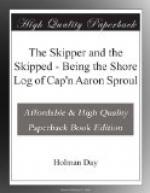And a day later, half sullenly, the Cap’n accepted the proposition of the directors of the bridge company, who had said some very flattering things to him about the reliability of the Sproul family. He reflected that he was far enough from tide-water to avoid the mariners who had known him in his former state. “I’ll dock and repair riggin’,” he pondered. “It’s a come-down, but I’ll clear and cruise again when the notion strikes me.”
His possessions came promptly by express—his sea-chest, two parrots, and a most amazing collection of curios that fairly transformed the little cottage where the skipper, with seaman’s facility in housekeeping, set up bachelor’s hall.
He grudgingly allowed to himself that he was going to like it. The sun beamed blandly warm on the little bench before the toll-house. His rheumatism felt better. People commented admiringly on such of the curios as were displayed in the windows of the cottage. And when the parrots—“Port” and “Starboard”—ripped out such remarks as “Ahoy!” “Heave to!” “Down hellum!” and larded the conversation with horrible oaths, the wayfarers professed to see great humor in the performance.
In a little while the parrots would squall as soon as a traveller appeared at the brow of the river hill or poked out from the dim depths of the covered bridge. Even when the Cap’n was busy in his little kitchen he never failed to receive due notice of the approach of persons either in wagons or on foot.
“It will be a good man who runs toll on this bridge,” he mused one day, as he poked dainties between the bars of the parrots’ cages. “The old ’un was a good man in his day, like all the Sprouls. He didn’t have but one arm, but there wa’n’t many that ever come it over him. I’ve been thinkin’ about one that did, and that he was scart of. If there was ever a man that scart him, and kept him scart till the day he died, then I’d like to see that same. It will be for me to show him that the nephy has some accounts of the poor old uncle to square.”
Up the slope where the road to Smyrna Bridge wound behind the willows there was the growing rattle of wheels. The Cap’n cocked his head. His seaman’s instinct detected something stormy in that impetuous approach. He fixed his gaze on the bend of the road.
Into sight came tearing a tall, gaunt horse, dragging a wagon equally tall and gaunt. The horse was galloping, and a tall man in the wagon stood up and began to crack a great whip, with reports like a pistol fusillade.
Cap’n Sproul took three defiant steps into the middle of the road, and then took one big step back—a stride that made his “rheumatiz speak up,” but a stride that carried him safely to his platform. The team roared past. The big whip swished over his head, and the snapper barked in his ear. He got one fleeting glimpse at the man who was driving—a man with a face as hard as a pine knot. His lips were rolled away from his yellow teeth in a grimace that was partly a grin, partly a sneer. A queer, tall, pointed cap with a knob on its top was perched on his head like a candle-snuffer on a taper. With a shrill yell and more crackings of his whip he disappeared into the gloomy mouth of the covered bridge, and the roaring echoes followed him.




